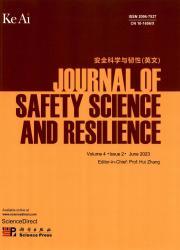确定医院员工的个人抗灾能力水平:卡尔塔尔-吕特菲-克尔达尔博士市医院案例研究
IF 3.4
Q1 PUBLIC, ENVIRONMENTAL & OCCUPATIONAL HEALTH
引用次数: 0
摘要
伊斯坦布尔是土耳其最重要的金融和工业中心之一,位于地震高发区。由于其历史悠久的建筑和高度城市化,该市人口众多,受地震影响的建筑群尤其脆弱。在伊斯坦布尔可能发生地震的情况下,医院员工必须具备较高的抗灾/复原能力。鉴于伊斯坦布尔 Kartal Dr. Lütfi Kırdar 市立医院的地震隔离和抗震结构及其为地震伤员提供服务的能力,这一点尤为重要。本研究探讨了 Kartal Dr. Lütfi Kırdar 市医院员工面对地震灾害时的应变能力水平,以及影响这些应变能力水平的各种因素。本研究的数据是通过 13 个问题的个人信息表和 DiTirro(2018 年)开发的 "个人抗灾能力评估(IDRA)"量表收集的。数据分析采用了描述性统计、皮尔逊卡方检验、独立样本 T 检验和单向方差分析。研究发现,医院员工的 IDRA 分数平均为 3.27。结论是参与者的平均抗灾能力得分高于中等水平。研究结果表明,接受灾害培训或提前做好防灾准备对个人的抵抗力/复原力有显著影响。在这种情况下,有必要确定伊斯坦布尔所有医护人员的抗震水平,尤其是本研究所在城市医院的医护人员。应提供必要的培训,规划模拟灾难演习,并将其纳入在职培训计划。此外,还应制定项目,确保医护人员在灾难发生时能安全到达医院。本文章由计算机程序翻译,如有差异,请以英文原文为准。
Determination of individual disaster resilience levels of hospital staff: A case study of Kartal Dr. Lütfi Kirdar City Hospital
Istanbul is one of Turkey's most important financial and industrial centers, and it is located in a region with a high potential for seismicity. Due to its historical architecture and high level of urbanization, the city has a large population and is particularly vulnerable due to the building stock that will be affected by earthquakes. In the event of a possible earthquake in Istanbul, it is crucial that the hospital staff have high levels of disaster resilience/resilience. This is particularly important given the seismically isolated and earthquake-resistant structure of Istanbul Kartal Dr. Lütfi Kırdar City Hospital and its capacity to serve those injured by the earthquake. This study examines the resilience levels of hospital staff at Kartal Dr. Lütfi Kırdar City Hospital in the face of earthquake disasters and the various factors that affect these resilience levels. The data for this study were collected using a 13-question personal information form and the ‘Individual Disaster Resilience Assessment (IDRA)’ scale developed by DiTirro (2018). Descriptive statistics, Pearson Chi-square tests, Independent Samples T-tests, and One-Way ANOVA were used to analyze the data. The research found that the hospital staff's IDRA scores averaged 3.27. It was concluded that the mean resilience score of the participants was above the medium level. The research findings show that receiving disaster training or being prepared for disasters in advance significantly influences individual resistance/resilience. In this context, it is essential to determine the earthquake resistance levels of all healthcare workers in Istanbul, especially those at the city hospital where the study was conducted. Necessary training should be provided, and simulation-based disaster drills should be planned and integrated into in-service training programs. Additionally, projects should be developed to ensure that healthcare workers can reach their hospitals safely during disaster situations.
求助全文
通过发布文献求助,成功后即可免费获取论文全文。
去求助
来源期刊

安全科学与韧性(英文)
Management Science and Operations Research, Safety, Risk, Reliability and Quality, Safety Research
CiteScore
8.70
自引率
0.00%
发文量
0
审稿时长
72 days
 求助内容:
求助内容: 应助结果提醒方式:
应助结果提醒方式:


